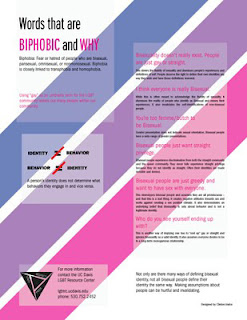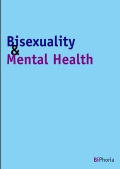words that are biphobic and why
Biphobia is a term that describes an aversion felt towards bisexual identity and bisexuals as individuals or as a group. Often biphobia arises from negative stereotypes associated with bisexuality.
WHAT DOES BIPHOBIA LOOK LIKE?
- Assuming that everyone you meet is either heterosexual or homosexual.
- Supporting and understanding a bisexual identity for young people because you identified “that way” before you came to your lesbian/gay/heterosexual identity.
- Expecting a bisexual to identify as heterosexual when coupled with the so called different gender/sex.
- Believing bisexual men spread AIDS/HIV to heterosexuals.
- Thinking bisexual people haven’t made up their minds.
- Assuming a bisexual person would want to fulfill your sexual fantasies or curiosities.
- Assuming bisexuals would be willing to “pass” as anything other than bisexual.
- Feeling that bisexual people are too outspoken and pushy about their visibility and rights.
- Automatically assuming romantic couplings of two women are lesbian, or two men are gay, or a man and a woman are heterosexual.
- Expecting bisexual people to get services, information, and education from heterosexual service agencies for their “heterosexual side” (sic) and then go to gay and/or lesbian service agencies for their “homosexual side” (sic).
- Feeling bisexuals just want to have their cake and eat it too.
- Believing that bisexual women spread AIDS/HIV to lesbians.
- Using the terms “phase” or “stage” or “confused” or “fence-sitter” or “bisexual” or “AC/DC” or “switch-hitter” as slurs or in an accusatory way.
- Thinking bisexuals only have committed relationships with so called different sex/gender partners.
- Looking at a bisexual person and automatically thinking of their sexuality rather than seeing them as a whole, complete person.
- Assuming that bisexuals, if given the choice, would prefer to be in an different gender/sex coupling to reap the social benefits of a so-called “Straight Privilege”.
- Not confronting a biphobic remark or joke for fear of being identified as bisexual.
- Assuming bisexual means “available”.
- Thinking that bisexual people will have their rights when lesbian and gay people win theirs.
- Being gay or lesbian and asking your bisexual friend about their lover or whom they are dating only when that person is the “same” sex/gender.
- Believing bisexuals are confused about their sexuality.
- Feeling that you can’t trust a bisexual because they aren’t really gay or lesbian, or aren’t really heterosexual.
- Expecting a bisexual to identify as gay or lesbian when coupled with the “same” sex/gender.
- Expecting bisexual activists and organizers to minimize bisexual issues (i.e. HIV/AIDS, violence, basic civil rights, fighting the Right, military, same-sex marriage, child custody, adoption, etc.) and to prioritize the visibility of so called “lesbian and/or gay” issues.
- Avoid mentioning to friends that you are involved with a bisexual or working with a bisexual group because you are afraid they will think you are a bisexual.
Click here to see original post



Comments
Post a Comment